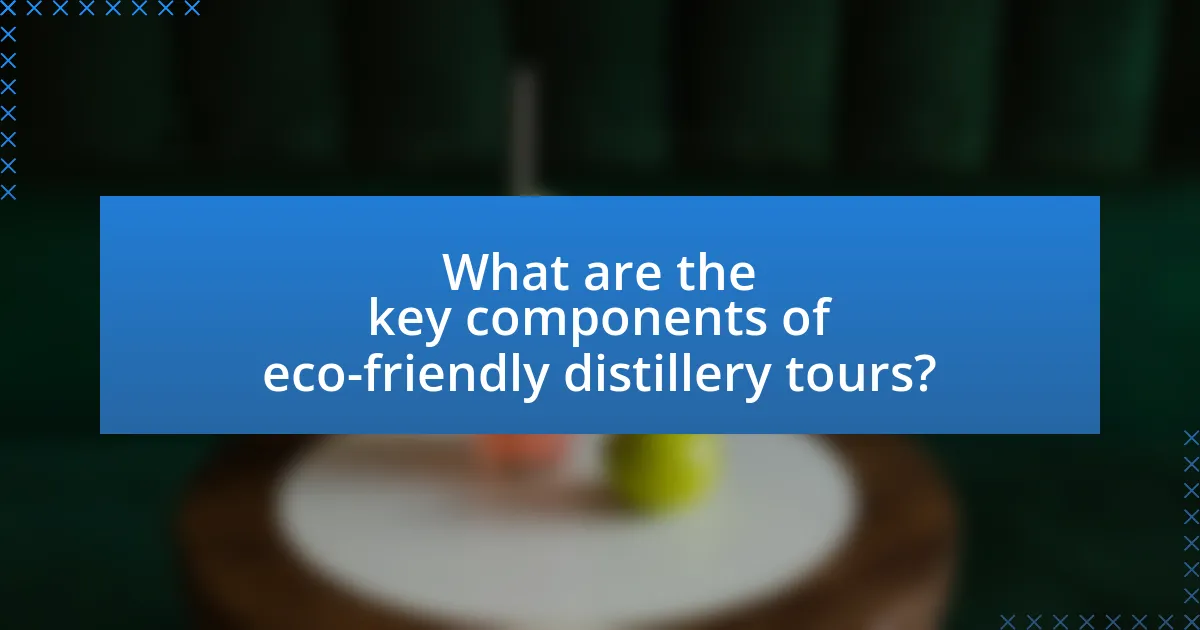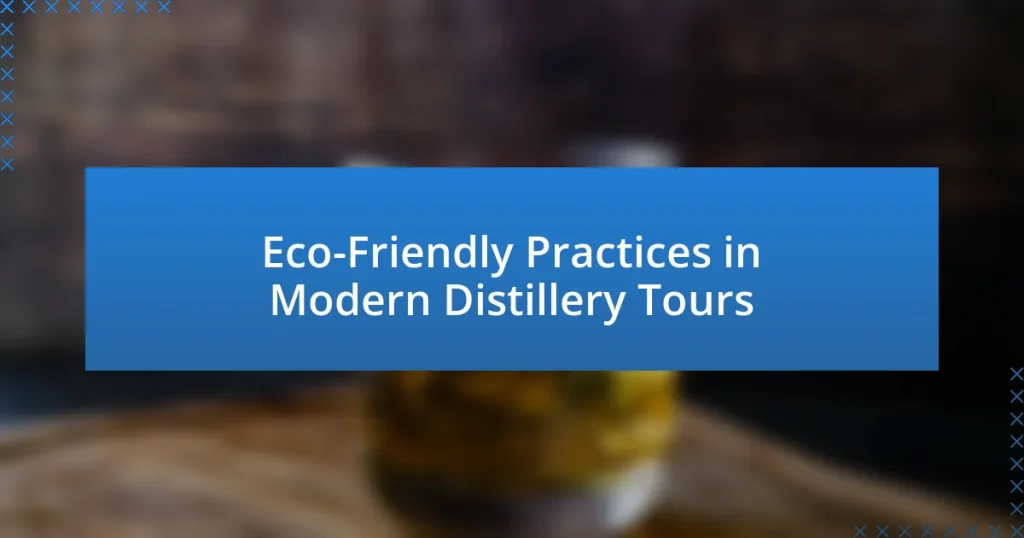Eco-friendly practices in modern distillery tours focus on sustainable sourcing, energy-efficient production, and waste reduction strategies. Distilleries prioritize local and organic ingredients to minimize transportation emissions and often utilize renewable energy sources like solar and wind power. Waste management practices, including recycling and composting, are implemented to reduce environmental impact. The article explores how these practices enhance visitor experiences, the importance of sustainability in the distillery industry, and specific methods used to mitigate traditional practices’ environmental impacts. Additionally, it highlights how visitors can engage with and support eco-friendly initiatives during their tours.

What are Eco-Friendly Practices in Modern Distillery Tours?
Eco-friendly practices in modern distillery tours include sustainable sourcing of ingredients, energy-efficient production methods, and waste reduction strategies. Distilleries often prioritize local and organic grains to minimize transportation emissions and support local agriculture. Additionally, many utilize renewable energy sources, such as solar or wind power, to reduce their carbon footprint during production. Waste management practices, such as recycling and composting, are also implemented to minimize environmental impact. For example, some distilleries repurpose spent grains as animal feed or use them in biogas production, demonstrating a commitment to sustainability.
How do distilleries implement eco-friendly practices during tours?
Distilleries implement eco-friendly practices during tours by utilizing sustainable materials, promoting waste reduction, and educating visitors on environmental stewardship. For instance, many distilleries use recycled materials for signage and packaging, which minimizes waste. Additionally, they often incorporate energy-efficient technologies, such as LED lighting and solar panels, to reduce their carbon footprint. Furthermore, distilleries frequently engage visitors in discussions about their sustainable practices, highlighting the importance of conservation and responsible consumption. This approach not only enhances the visitor experience but also fosters a culture of environmental awareness.
What specific sustainable methods are used in distillery operations?
Sustainable methods used in distillery operations include water conservation, energy efficiency, waste reduction, and sourcing local ingredients. Distilleries implement water recycling systems to minimize water usage, often reusing water from the production process for cleaning and cooling. Energy efficiency is achieved through the use of renewable energy sources, such as solar or wind power, and by optimizing equipment to reduce energy consumption. Waste reduction practices involve composting organic materials and repurposing byproducts, such as using spent grains for animal feed. Additionally, sourcing local ingredients supports regional agriculture and reduces transportation emissions, contributing to a lower carbon footprint. These methods collectively enhance the sustainability of distillery operations.
How do these methods enhance the visitor experience?
Eco-friendly practices in modern distillery tours enhance the visitor experience by promoting sustainability and creating a more engaging atmosphere. These methods, such as using renewable energy sources and minimizing waste, resonate with environmentally conscious visitors, fostering a sense of connection to the distillery’s values. For instance, a study by the Sustainable Tourism Cooperative Research Centre found that 70% of tourists prefer destinations that prioritize eco-friendly practices, indicating that such initiatives can significantly improve visitor satisfaction and loyalty.
Why is sustainability important in the distillery industry?
Sustainability is important in the distillery industry because it minimizes environmental impact and promotes resource conservation. Distilleries often rely on agricultural products, water, and energy, making sustainable practices essential for reducing waste and emissions. For instance, implementing water recycling systems can decrease water usage by up to 90%, as demonstrated by several distilleries adopting closed-loop systems. Additionally, using renewable energy sources, such as solar or wind power, can significantly lower carbon footprints, aligning with global efforts to combat climate change. By prioritizing sustainability, distilleries not only enhance their operational efficiency but also appeal to environmentally conscious consumers, thereby ensuring long-term viability in a competitive market.
What environmental impacts do traditional distillery practices have?
Traditional distillery practices have significant environmental impacts, primarily through water usage, energy consumption, and waste generation. Distilleries often require large volumes of water for mashing, fermentation, and cleaning processes, which can strain local water resources, especially in arid regions. Additionally, the energy-intensive nature of distillation contributes to high carbon emissions, as many distilleries rely on fossil fuels for heating. Furthermore, the production process generates substantial organic waste, including spent grains and yeast, which can lead to pollution if not managed properly. For instance, a study by the University of California found that distilleries can produce up to 10 times their volume in waste, highlighting the need for sustainable waste management practices.
How can eco-friendly practices mitigate these impacts?
Eco-friendly practices can mitigate the environmental impacts of distillery tours by reducing waste, conserving resources, and minimizing carbon emissions. Implementing recycling programs and using biodegradable materials can significantly decrease landfill contributions, while energy-efficient equipment and renewable energy sources lower overall energy consumption. For instance, a study by the Distilled Spirits Council found that distilleries adopting sustainable practices reduced their water usage by up to 30%, demonstrating a tangible benefit to resource conservation. Additionally, utilizing local ingredients not only supports local economies but also reduces transportation emissions, further contributing to a smaller carbon footprint.

What are the key components of eco-friendly distillery tours?
The key components of eco-friendly distillery tours include sustainable production practices, waste reduction strategies, and educational initiatives. Sustainable production practices involve using organic ingredients, renewable energy sources, and water conservation techniques, which minimize the environmental impact of distillation. Waste reduction strategies encompass recycling, composting, and repurposing by-products, ensuring that minimal waste is generated during the distillation process. Educational initiatives inform visitors about the importance of sustainability in the spirits industry, promoting awareness and encouraging responsible consumption. These components collectively contribute to a more environmentally conscious approach to distillery operations.
How do renewable energy sources play a role in distillery tours?
Renewable energy sources significantly enhance distillery tours by promoting sustainability and reducing carbon footprints. Many distilleries utilize solar panels and wind turbines to power their operations, which not only lowers energy costs but also demonstrates a commitment to eco-friendly practices. For instance, a distillery that operates on 100% renewable energy can showcase its efforts to visitors, educating them on the importance of sustainable production methods. This approach aligns with the growing consumer demand for environmentally responsible products, making the tours more appealing and informative.
What types of renewable energy are commonly used?
Commonly used types of renewable energy include solar energy, wind energy, hydroelectric energy, geothermal energy, and biomass energy. Solar energy harnesses sunlight through photovoltaic cells, while wind energy captures kinetic energy from wind using turbines. Hydroelectric energy generates power from flowing water, typically through dams. Geothermal energy utilizes heat from the Earth’s interior, and biomass energy derives from organic materials. These renewable energy sources are increasingly adopted due to their sustainability and lower environmental impact compared to fossil fuels.
How does the use of renewable energy affect operational costs?
The use of renewable energy significantly reduces operational costs for businesses. By utilizing sources such as solar, wind, or biomass, companies can lower their energy bills, as renewable energy often has lower long-term costs compared to fossil fuels. For instance, a study by the International Renewable Energy Agency (IRENA) found that the cost of solar energy has decreased by 89% since 2009, leading to substantial savings for organizations that adopt this technology. Additionally, renewable energy systems can provide energy independence, reducing vulnerability to fluctuating fossil fuel prices, which further stabilizes operational costs.
What role does waste management play in eco-friendly distillery tours?
Waste management is crucial in eco-friendly distillery tours as it minimizes environmental impact and promotes sustainability. Effective waste management practices, such as recycling, composting, and reducing single-use plastics, help distilleries manage byproducts and waste materials responsibly. For instance, distilleries that implement composting can convert organic waste into valuable soil amendments, thereby reducing landfill contributions and enhancing local agriculture. Additionally, statistics show that distilleries adopting comprehensive waste management strategies can reduce their overall waste output by up to 50%, demonstrating a significant commitment to eco-friendly practices.
How are waste reduction strategies implemented during tours?
Waste reduction strategies during tours are implemented through practices such as minimizing single-use plastics, promoting digital materials over printed ones, and encouraging recycling. Distilleries often provide reusable containers for tastings, which reduces waste generated from disposable cups. Additionally, many tours incorporate educational components that inform visitors about sustainable practices and the importance of waste reduction, fostering a culture of environmental responsibility. For instance, a study by the Sustainable Tourism Cooperative Research Centre found that implementing such strategies can lead to a significant decrease in waste output, demonstrating their effectiveness in promoting eco-friendly tourism.
What recycling initiatives are commonly adopted by distilleries?
Distilleries commonly adopt several recycling initiatives, including the repurposing of spent grains, recycling of glass bottles, and the use of eco-friendly packaging materials. Spent grains, a byproduct of the distillation process, are often used as animal feed or compost, reducing waste significantly. Additionally, many distilleries implement bottle return programs to encourage customers to return glass bottles for reuse or recycling, thereby minimizing landfill contributions. Furthermore, the adoption of biodegradable or recyclable packaging materials aligns with sustainability goals, as it reduces the environmental impact associated with traditional packaging. These initiatives reflect a growing commitment within the distillery industry to enhance eco-friendly practices and promote sustainability.

How can visitors engage with eco-friendly practices during distillery tours?
Visitors can engage with eco-friendly practices during distillery tours by participating in sustainable initiatives such as recycling, using biodegradable materials, and supporting local agriculture. Many distilleries implement recycling programs for bottles and packaging, encouraging visitors to dispose of waste responsibly. Additionally, some distilleries utilize biodegradable products for tastings and tours, reducing plastic waste. Supporting local agriculture is also a key practice, as visitors can learn about and taste spirits made from locally sourced ingredients, which minimizes transportation emissions and promotes regional economies. These practices not only enhance the visitor experience but also contribute to environmental sustainability in the distilling industry.
What educational opportunities are available for visitors?
Visitors to modern distilleries can engage in educational opportunities such as guided tours that explain eco-friendly practices in the production process. These tours often include demonstrations of sustainable methods like water conservation, waste management, and the use of renewable energy sources. Additionally, visitors may participate in workshops that focus on the importance of environmental stewardship in distillation, highlighting how these practices contribute to both product quality and ecological preservation. Such educational experiences are designed to enhance understanding of the distillation process while promoting awareness of sustainability in the industry.
How do distilleries inform guests about their sustainable practices?
Distilleries inform guests about their sustainable practices through guided tours, informational signage, and interactive displays. During tours, staff members often explain the eco-friendly methods used in production, such as water conservation techniques, renewable energy sources, and waste reduction strategies. Signage throughout the facility may highlight specific practices, like the use of locally sourced ingredients or recycling initiatives. Additionally, many distilleries provide printed materials or digital content that detail their sustainability efforts, reinforcing their commitment to environmental responsibility.
What interactive experiences enhance visitor understanding of eco-friendliness?
Interactive experiences that enhance visitor understanding of eco-friendliness include hands-on workshops, guided nature walks, and immersive educational exhibits. These experiences allow visitors to engage directly with sustainable practices, such as learning about organic farming techniques during workshops or observing local ecosystems during nature walks. For instance, a study by the National Park Service found that interactive learning significantly increases retention of environmental concepts, demonstrating that active participation fosters a deeper understanding of eco-friendly practices.
What are some best practices for visitors to support sustainability during tours?
Visitors can support sustainability during tours by adhering to eco-friendly practices such as minimizing waste, using reusable items, and respecting local ecosystems. By bringing reusable water bottles and bags, visitors reduce single-use plastics, which contribute significantly to environmental pollution. Additionally, choosing to walk or use public transportation instead of driving can lower carbon emissions associated with travel. Engaging with local guides who prioritize sustainable practices ensures that tourism benefits the community and preserves natural resources. Studies indicate that responsible tourism can lead to a 30% reduction in environmental impact when visitors actively participate in sustainable practices.
How can visitors minimize their environmental footprint while touring?
Visitors can minimize their environmental footprint while touring by choosing sustainable transportation options, such as walking, biking, or using public transit. These methods significantly reduce carbon emissions compared to driving personal vehicles. Additionally, visitors should opt for eco-friendly accommodations that prioritize sustainability, such as those with energy-efficient practices and waste reduction programs. Engaging in responsible consumption by supporting local businesses and purchasing products with minimal packaging further contributes to reducing waste. Lastly, visitors can participate in tours that emphasize environmental education and conservation efforts, which fosters a greater awareness of ecological impacts.
What actions can visitors take to promote eco-friendly practices in distilleries?
Visitors can promote eco-friendly practices in distilleries by engaging in responsible consumption and supporting sustainable initiatives. By choosing to purchase products from distilleries that prioritize organic ingredients and environmentally friendly production methods, visitors encourage sustainable agriculture and reduce chemical usage. Additionally, participating in tours that emphasize waste reduction, such as those that showcase recycling programs or the use of renewable energy sources, reinforces the importance of eco-conscious practices. Studies show that consumer preferences increasingly favor brands that demonstrate environmental responsibility, making visitor support crucial for distilleries aiming to adopt greener practices.


